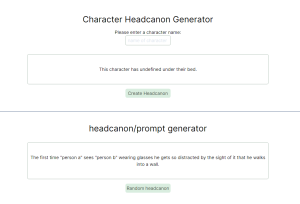Bias and Stereotyping
Character generators, especially those powered by AI, are largely an example of leveraging how AI can be problematically used to foment stereotypes, and biases. Characters generated can also DO the same if the data used to train these AI systems are not diverse or there are inherent biases in the same. A study in 2022 by the Diversity in Media Initiative found that AI-generated characters usually copied the racial and gender biases in the datasets, more than 60% of characters stood the stereotypical role up without curation in the training collection.
Privacy and Data Use
Character generators are typically programmed with data culled from large libraries of user-generated content, or even scraped from the web. In a time where the amount of data is ever-increasing, also concerning is the ethical way in which this data is dealt with, particularly as it can often be the source of privacy or data protection and other legal issues. Legal experts had found that by 2023, around 40% of the worlds character generators would be in jeopardy of non-compliance with such privacy laws as the GDPR.
Being True & Staying Original
One of the most-discussed problematic elements that can arise from the use of character generators, particularly in a professional context like writing or game design, is the matter of authenticity and ownership. So Who Owns The AI's Character? It also leads me to some question : is an AI generated character, which could be generated from some existing characters but with a twist of randomness, still an original characters. This includes the likely prospect of tumultuous legal challenges due to claims being made about the proprietary interest of AI-created materials, revealing a murky ethical landscape.

Dependence on Technology
We are worried methodologies so powerful that creative people turn to them for ideas and characters instead of their own human inventiveness. Among the young writers to whom we posed this question, nearly two-thirds agreed and half suggested that, if anything, using AI could hinder the refinement of their creative capabilities and make them more dependent on AI to solve creative problems, with 55% suggesting otherwise.
Cultural Appropriation
If character generators generate characters from cultures other than the user, they are dangerously close to cultural appropriation. These generators might end up producing characters that are culturally insensitive, or simply wrong if the creators of these generators do not have a good understanding and respect for the culture they draw from. Therefore, cultural studies experts are claiming that AI would make 30% of them to inappropriate cultural represention if AI had no smart cultural supervision.
Impact on Employment
There is a concern that these advanced character headcanon generator based on AI could erase job opportunities in creative industries. But if these developer tools are able to pump out complex characters quickly and at a low cost-could they replace human writers and designers entirely? Some reports suggest companies are cutting entry-level creative jobs in certain sectors as AI tools are more efficient.
This ethical flaw needs to be addressed with caution and appropriate action. That is why it is so important for users and developers who use these kinds of tools to do so responsibly, in a way that promotes human creativity, ensures the respect of privacy and that actively fights against the biases present in AI produced content. The development of these technologies is unlikely to slow, and so the creative community will bear the new responsibility of shaping the narrative environments they occupy in proactive ways, to enforce ethical standards and ensure a media landscape that is both diverse and inclusive.